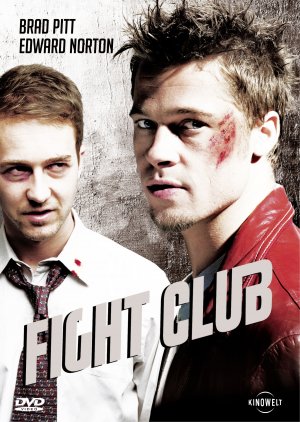"Well. Whatever. You can't teach God anything."
It's very hard to review this book without comparing it to the movie, but Fight Club as a novel really impressed me. It's unsurprising, given that typically an original book will be better than it's screen adaptation, but Fight Club is a rare case where the movie comes close and in some ways even supersedes the novel. The ending of the film adaptation has been praised by critics, but I find that it's very epic and world-relevant - it makes a clear point about Tyler and what he wants for society, his world view - where the novel's ending is more character-centred and I find it magnificent. If you haven't picked up this book yet, you really should. The movie stayed fairly close in terms of plot and even specific scenes, but there are extra goodies that you'll really enjoy if you're into Tyler Durden's philosophy.Film is capable of doing some things with visuals in a way that is very effective, but clearly words can be just as powerful. In fact, I found that much of the movie narration came directly from the book. Certainly the tone of the narrator character is unchanged between novel and screenplay. A lot of the writing remained unchanged, but every alteration really tightened up the dialogue.
"You buy furniture. You tell yourself, this is the last sofa I will ever need in my life. Buy the sofa, then for a couple years you're satisfied that no matter what goes wrong, at least you've got your sofa issue handled. Then the right set of dishes. Then the perfect bed. The drapes. The rug. Then you're trapped in your lovely nest, and the things you used to own, now they own you."
Sounds pretty familiar, eh? There are some original quotes, beautifully written by Palahniuk, that didn't make it into the film, such as this one: "I just don't want to die without a few scars, I say. It's nothing anymore to have a beautiful stock body. You see those cars that are completely stock cherry, right out of a dealer's showroom in 1955, I always think, what a waste." Palahniuk is very intentional in his writing. His every word gets across the dark and complex narrator character and the Tyler Durden philosophy. This character is brilliantly brought to life by Ed Norton's acting, and I didn't even try to picture the narrator any other way. But it was fun to imagine Norton in both familiar scenes such as when Tyler pours burning lye on his hand, and some that didn't make it into the film. There's this great scene where Marla chases the narrator around the house screaming, "You ate my mother!" I'm not going to tell you how that situation arises, you'll have to read the book for yourself. Trust me, it's worth it just for that. Like I said, the film stays fairly close to the plot of the novel, but there are some need goodies that didn't make that cut and make the novel worth the read for any fan.
I'm a fan of the novel's ending. The ending of the film's screenplay stayed truer to Tyler's ideology. His desire for destruction of consumerism is actualised in the destruction of the credit towers. But the novel's ending is much more personal and centred on that character's experience. What both the novel and the film do well is making you wonder whether the narrator really wants all this destruction, and with the novel's ending we get to see him hide from that which his psyche wanted so badly that it manifested in a second personality. In both cases he rebels against Tyler, as I said here, but in the book it's a much more personal battle, much more interested in his own desire for survival pitted against his subconscious desire for oblivion. But hopefully you won't take my word for it. Go read the book yourself if you haven't already!

No comments:
Post a Comment